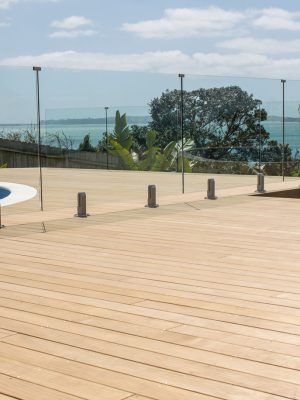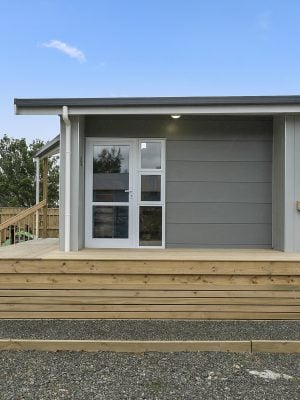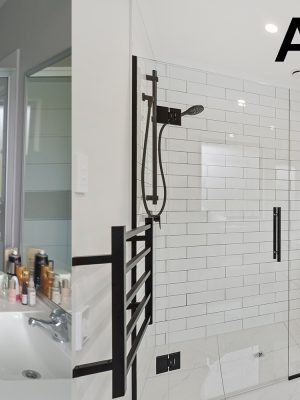Last month we talked to NZCB’s Regional Presidents about why first-home buyers should consider building instead of buying their first home. They had heaps of valuable advice, so this month we’ve talked to them about what to look out for when building a kitset home and how to find the right builder for your architecturally designed home.
With bank interest rates forecast to continue dropping and Covid-19 meaning we’re all doing our bit to restart the economy, there’s never been a better time to build. The increase of kitset homes on the market can make them an attractive, seemingly easier building option.
Kitset homes are manufactured in a factory and usually arrive flat packed or are transported on back of truck to site. You then get a builder to put them together. These are “labour only” jobs for builders.
NZCB Member Richard Poff of RTP Builders in Canterbury says kitset homes have their place. “If they come from a reputable manufacturer, they can be a good option. From the homeowner position they can be good, however, there are a few things to note,” he says.
“While there are quite a few different types, each home is generally made as a ‘one-off’. All things must be sorted before the house goes into the ‘factory’ stage. I am currently involved in a ‘Fraemohs’ house. This is a modern take on the log house style. They have been around for many years and I would consider their designs and manufacturing processes to be very good. However, everything has to be finalised before it hits the factory, for example, the lighting and wiring layout. As it is all solid wall, all the wire ducts are pre-drilled as part of the manufacturing process and it is very difficult to add an extra powerpoint later. Variations are often unable to be done as an afterthought.”
He also says kitset homes come with a specific build ‘process’ that may not be what many builders are used to, so it pays to check with your builder if the home you want is something they’re comfortable building. You can find your local NZCB builder here.
NZCB Member Dave Gunter of Coastal Designs Ltd in Motueka says it’s important to check what is included in your kitset. “You might come unstuck when you think everything is included and you find that in fact there are a lot of little components required to meet building code requirements. If, for example, the kitset is closed in stage only (not including foundation) there will be many other things to include in your costing – foundation material costs, engineers, designers, plumber, roofers, sparky, drain-layers, brick-layers, internal material costs. It’s always good to get the professional opinion of a Licensed Building Practitioner if you’re unsure.”
NZCB Member Mike Craig, of MC Builders in Waikanae, says kitset homes usually come with only shell only and you need to source the rest. “You often get quoted for kitset only and have to add transport to site and site services costs. There’s also often really no choice on layout or very limited material choice,” he says.
“Not only that but banks may not lend on kitsets because they are built in factory or flatpack. This creates additional risk for banks because they have no fixed asset sitting on land owned by their client. And you, as homeowner, have the added stress of project management, finding a builder and subtrades.”
Ian Chamberlain, of Chamberlain Carpentry and Joinery in Taupō, says another risk with bank lending is that kitset homes normally have to be paid in two payments. “This doesn’t always suit the banks,” he says.
He adds that the house normally turns up in two deliveries – components at beginning and then final lot halfway through, so you need space to store materials, including your carpets, kitchen fittings etc.
“Even with a kitset home you will still often need a qualified builder/building company to construct the house for you. These are often built on a set design and so may limit options for customisation. And you need to ensure the design you choose works with your site.”
Okay, so now you’re aware of some of the risks with kitset homes, you might be wondering if using an architect or architectural designer is a better path forward. But then you still need to find the right builder, we asked our team of experts what to look for when building an architectural home. They all agreed that checking your potential builder’s references and past clients’ projects is essential.
Dave says it’s important to always ask the builder to provide you with at least four of their past clients’ contact details, so you can contact them independently.
“Ring them and ask about the build process – how was it, any problems, would they do it again with the same builder? Other clients speaking about their experience is a great way of judging the building experience you will receive and whether that builder will match up with the project you are doing.”
Mike says it’s important to check out your builder’s reputation. “Ask your wider group of friends, family or neighbours for their opinions. Look at the builder’s website and see how they present themselves.”
He says the next step is to invite them to your house for an interview and see how they respect your space and property. “Did they take their shoes off, have a card to identify themselves? Did they bring with them references and material for you to study and could they hold a conversation with you which didn’t involve building? Ask if you could look at some of their work. He also recommends asking their references how they found working with the builder – were they on time, was the budget ok, did they get a lot of extra cost they didn’t expect?
Ian agrees, and says ideally you and your builder would then choose your architect together.
“A good builder can help guide you through the process to get the best value for money from your designer’s or architect’s design. They can provide good practical input. This helps you get a better grasp on the pricing and practical side of the build. Your engagement is longer with the builder and most of the work is with him.”
Richard says checking your builder’s previous work is absolutely key. “A homeowner looking to build needs to talk with friends and family for a referral. This is where a smart builder will always shine – no matter how big or small a job is, everyone has friends and family, and that is where good referrals come from. Of course, as a backup, finding a local NZCB member is a very good move,” he says.
“If a homeowner is looking for someone to take on their architecturally designed home, they need to check out what that builder has done before. The builder should be able to provide some sort of CV of past work and hopefully happy client references. I have always gone a separate route to this – I tell folks to find a good or recommended builder and work with the builder’s preferred designer. Generally this will produce a good outcome, and more likely to go closer to an affordable budget. It should also end with a design that is straightforward to build. Assuming that the builder and designer have a good working relationship, a workable and realistic design can be sorted quite quickly.”






